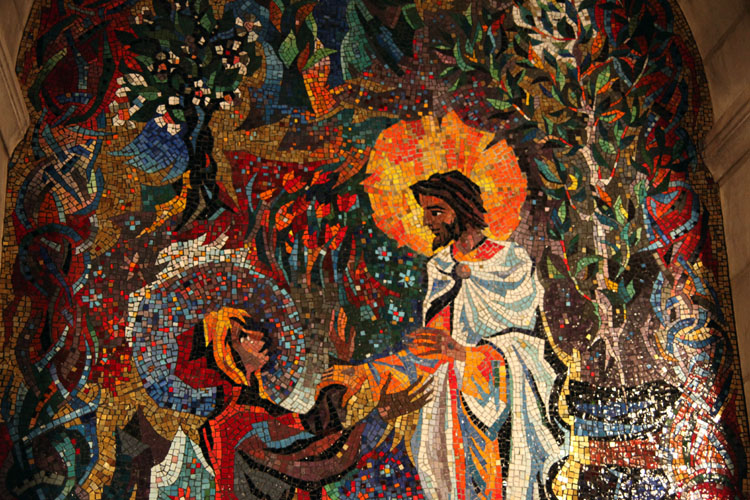Acts 2:14a, 36-41 • Ps. 116:1-3, 10-17
1 Pet. 1:17-23 • Luke 24:13-35
Walking over the face of the deep, walking out from death’s tomb, stepping onto the footpath to Emmaus, Jesus seems to slip by; he moves on (Mark 6:48; Luke 24:28). He is ghostlike, strange, and hidden. And yet he is the Word made flesh whose blood and body are the sacred substance of a new humanity. Apprehending this reality and this mystery, the true life of Christ Jesus, is contingent upon human consent buried in the will and grace of God. Mary said, “Let it be to me according to your word” (Luke 1:38). We might say the same, or say, “Stay with us” (Luke 24:29), and thus stop him from passing by.
He wants to be stopped; he wants to stay; he wants to recline at table (Luke 24:30). He desires bread and wine, and the company of burning hearts (Luke 24:31-32). His wounds and cleft heart open a red torrent of love that flows like the four great rivers (Gen. 2:10-14) stretching over the known world. He is the divine presence flowing over and through the world, awaiting an invitation into each and every home.
What shall we do (Acts 2:37)? Open the door of the heart. Bring recent sorrows to light. Admit even that hope has failed. Grieve. Listen to him; listen to how he speaks about himself through the ancient stories. Ask him to stay the night. Take the bread he gives and drink the wine he blesses. Feel the slow burn of a pure heart. Recognize him and see him, and then do not hold him as a private and material possession. Repent and run to the river and receive the gift of the Spirit. Blessed are the pure in heart, for theirs is the kingdom of heaven. “Behold, I stand at the door, and knock: if any man hear my voice, and open the door, I will come in to him and will sup with him and he with me” (Rev. 3:20, KJV). The heart grows where Christ is (Luke 1:46).
Open the door of the heart. “You have been born anew, not of perishable but of imperishable seed, through the living and enduring word of God” (1 Pet. 1:23). Jesus Christ has burst from the grave and awaits our love and yet is the cause of our love’s longing. “Seek,” says the saint, “whence it is given to humans to love God and you will find nothing, except that God first loved humanity. God gave the very God whom we love; God gave the cause of love. What God gave hear more openly through the apostle Paul: The Love of God, he says, has been poured into our hearts. Whence? Is it perhaps from us? No! Then where is it from? Through the Holy Spirit which has been given to us” (St. Augustine, Sermo 34, my rather literal translation).
There is no real accounting for the resurrection. It is the impossibility of God’s work to renew humanity and all creation. It is never fully grasped, but it can be embraced, and once accepted, life becomes all new and gratitude and service become a natural outgrowth. “What shall I return to the Lord for all his bounty to me? I will lift up the cup of salvation and call on the name of the Lord, I will pay my vows to the Lord in the presence of his people” (Ps. 116:12-14).
Love’s vow to the risen Lord never says “until we are parted by death,” for in the new life of Christ death is a grave and gate opening upon another shore. Love has done this, love unending.
Look It Up
Read Acts 2:38. Three parts.
Think About It
Luke 24 is the liturgy.
Image: Resurrection Chapel, National Cathedral, D.C., by Tim Evanson/Flickr










